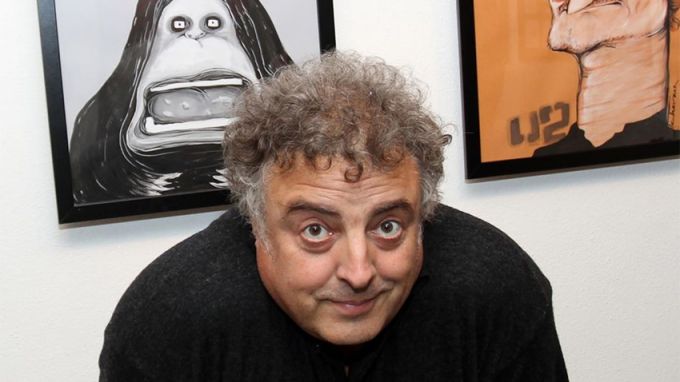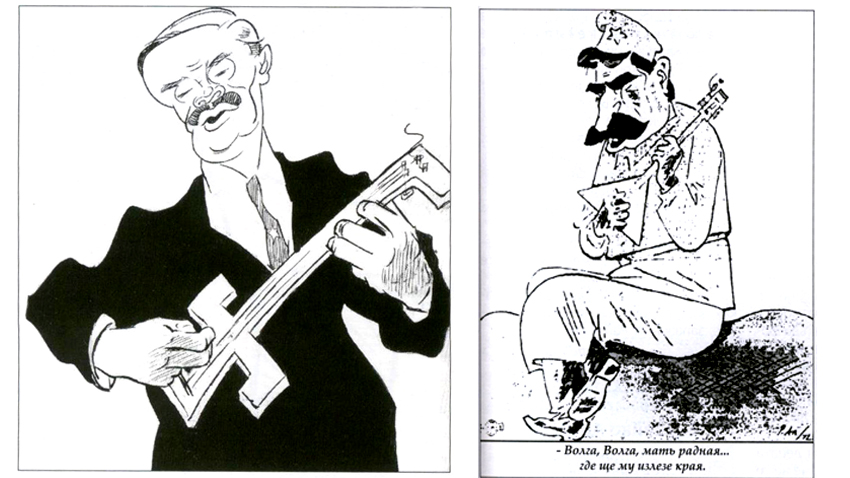 3
3
“The power of words: networks, radicalization, ridicule” - this is the title of an international conference organized at the National Assembly to mark International Francophonie Day. The forum focused on the radicalization of young people in social networks and humour as a form of political critique.
The participants included prominent cartoonist Chavdar Nikolov. "Do you know when and where the genre was actually born? In the 16th century in Italy", he says. To begin with it was just a bit of fun at artist studios. Political cartoons appeared in the 18th-19th century to develop into an instrument of the freedom of speech, but also a propaganda weapon. As a matter of fact being a cartoonist is not always safe.
 There are ample examples, including here, in Bulgaria. In 1925 a silent civil war was raging in the country, with lives taken on both sides most often than not in terrorist attacks. Around a week before the bomb attack on the St. Nedelya church organized by the military organization of the communist party, a cartoon by Alexander Dobrinov came out in the papers, depicting Death saying: This year Christ will not be resurrected. And just a few days later came the bomb attack that killed 213 and wounded 500. Alexander Dobrinov was arrested on suspicion of conspiracy with the terrorists. “He spent around 6 months in prison until prominent politician and journalist Dimo Kazasov put in a good word for him, only then was he released,” Chavdar Nikolov says. “Alexander Dobrinov was ever out of favour with all regimes – after 9 September 1944, when a pro-Soviet government was installed, the so-called People’s Court sentenced him to two years of imprisonment because of his illustrations of life in the Soviet Union.”
There are ample examples, including here, in Bulgaria. In 1925 a silent civil war was raging in the country, with lives taken on both sides most often than not in terrorist attacks. Around a week before the bomb attack on the St. Nedelya church organized by the military organization of the communist party, a cartoon by Alexander Dobrinov came out in the papers, depicting Death saying: This year Christ will not be resurrected. And just a few days later came the bomb attack that killed 213 and wounded 500. Alexander Dobrinov was arrested on suspicion of conspiracy with the terrorists. “He spent around 6 months in prison until prominent politician and journalist Dimo Kazasov put in a good word for him, only then was he released,” Chavdar Nikolov says. “Alexander Dobrinov was ever out of favour with all regimes – after 9 September 1944, when a pro-Soviet government was installed, the so-called People’s Court sentenced him to two years of imprisonment because of his illustrations of life in the Soviet Union.”
Another Bulgarian cartoonist – Alexander Bozhinov drew Molotov with Nazi symbols at the time the Molotov–Ribbentrop Pact when relations between the USSR and Germany were spotless. He too had to face the “People’s Court” with talented artist Iliya Beshkov, who was known for his left-wing leanings, as witness against him. The judge turned to Beshkov with the words: "Mr. Beshkov you are the best Bulgarian cartoonist". But he answered: "No, the best cartoonist in Bulgaria is now standing trial."

“Still, the People’s Court gave the artist a one year suspended sentence. The worst fate in the history of Bulgarian cartoons is that of Rayko Alexiev. One of his cartoons, published by Shturets (Cricket) newspaper showed Stalin playing the balalaika with the caption: Mother Volga, wherefore the outcome. Rayko Alexiev was killed and was convicted by the People’s Court afterwards.”
There are stories of freedom of thought and civic commitment in more recent times as well.
 “In 1968 dissident satirist Radoy Ralin and cartoonist Boris Dimovski published a little book called Chili peppers. A fortnight later all books printed were rounded up and burnt at the printing house, most of all because of a cartoon by Boris Dimovski, illustrating one of Radoy Ralin’s epigrams – “A full belly the brain shall drain”. The illustration was of a pig with a signature for a tail – in that tail one of the poets of those times recognized the signature of communist dictator Todor Zhivkov. So, the entire circulation was burnt, though copies are still to be found here and there at second-hand book stores. Both Radoy Ralin and Boris Dimovski lost their jobs and were out of favour for a very long time.”
“In 1968 dissident satirist Radoy Ralin and cartoonist Boris Dimovski published a little book called Chili peppers. A fortnight later all books printed were rounded up and burnt at the printing house, most of all because of a cartoon by Boris Dimovski, illustrating one of Radoy Ralin’s epigrams – “A full belly the brain shall drain”. The illustration was of a pig with a signature for a tail – in that tail one of the poets of those times recognized the signature of communist dictator Todor Zhivkov. So, the entire circulation was burnt, though copies are still to be found here and there at second-hand book stores. Both Radoy Ralin and Boris Dimovski lost their jobs and were out of favour for a very long time.”
Another Bulgarian cartoonist Todor Tsonev drew former socialist rulerTodor Zhivkov practically every day, but it was only after the democratic changes in 1989 that he was able to show his work to the public at a grand exhibition. “It is arguably the exhibition with the biggest attendance in the history of the country,” says Chavdar Nikolov.
English version: Milena Daynova
The photo gallery below shows works by Chavdar Nikolov
Sylvia Tomova, a star of the Bulgarian stage, received her training at the Vaganova State Ballet Academy in Saint Petersburg. Her career has been closely linked to the National Opera and Ballet, where, as a prima ballerina, she has performed over 90..
Canada-based Bulgarian artists Petar Boyadzhiev and Daniela Zekina will present their joint exhibition “AlterEgo” in Chicago on November 1 . Their new paintings with graphics and paintings will be exhibited at the “Bagrena” Gallery at the Bulgarian..
The Bulgarian-English co-production “Devil’s Play” won the Best Cinematography Award at the prestigious Chelsea Film Festival in New York, announced the Consulate General of Bulgaria in New York on Facebook. The film was screened as part of the..

+359 2 9336 661
